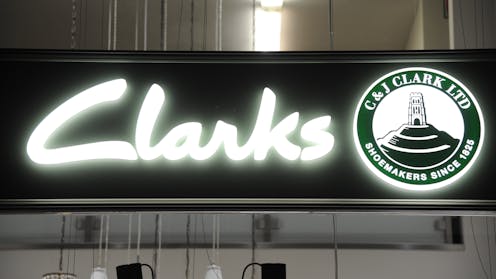Shoemaker Clarks is turning 200. Its Quaker roots made it a pioneer of ethical business
- Written by Nicholas Burton, Professor, Department of Leadership and Human Resource Management, Northumbria University, Newcastle

For many, the Clarks brand is a byword for sturdy school shoes and functional footwear for those of more mature years. The manufacturing and retailing company was set up two centuries ago in Somerset, England, in the shadows of Glastonbury Tor, by brothers Cyrus and James Clark. In 2025, it is celebrating its 200th anniversary and remains a formidable force both on the high street and online.
Less well known is that the Clark brothers, like chocolatier families Cadbury and Rowntree, were Quakers. This small religious community has produced a remarkable and disproportionate number[1] of scientists, thinkers and campaigners for justice, peace and human rights. In addition, its contribution of ethical businesses has dominated many industries in the UK.
The Lloyds[2] and Barclays[3] of the banking dynasties were Quakers. The Jacobs[4] (of biscuits and crackers fame) were Quakers. So were the Rathbones[5] (fund management), the Penroses[6] (founders of Waterford Crystal) and the Waterhouse family[7] (accountancy), to name just a few.
The Quakers[8] – more formally known as the Religious Society of Friends (Quakers) – have a history of nearly 400 years in Britain and the US. While Quakerism has Christian foundations, Quakers also emphasise moral commitments to peace, truth, integrity, simplicity and equality – the five testimonies[9] in Quaker theology. These came to define how Quakers approach the world, and their businesses.
However, all firms from time to time face challenges to the way they do business. The balance between economics and ethics can be a fine line to tread. It’s no different for Clarks. Struggling to survive the impact of the COVID pandemic in 2020, and with losses mounting, the Clark family sold its stake[22] to a private equity firm.
Within 12 months, Clarks workers accused the new owners of betraying the company’s philanthropic roots[23] by threatening them with dismissal if they did not accept significant pay cuts. Clarks said at the time that renegotiating workers’ terms would be a “very last resort”[24] and that almost half of the workers in the distribution centre in question would receive a pay rise.
The dispute involved strike action and mediation, eventually leading to a resolution. Afterwards, Clarks said in a joint statement[25] with the Community union that the resolution had protected workers’ livelihoods and recognised their loyalty to the firm.
This demonstrated how firms can face repeated cycles of crises, including competitive, financial and economic shocks that bring debates about ethics into focus. These crisis events are typically more acute when a founder, CEO or family departs, and especially when those involved with the company honour its tradition and legacy. Rathbones, the fund management company with Quaker origins, was faced with similar challenges[26] when the family was no longer actively involved.
Yet despite the economic and financial pressures that Clarks faced in this exceptional period, the firm is also attempting to protect the core of its moral backbone. It echoes an affinity – albeit a more distant one – with the Quakerism of the founding family.
This stance can potentially be fragile, however. Businesses must remain viable as businesses – and only last year Clarks was facing up to a difficult trading environment by cutting 150 office staff[27]. Indeed, the previous conversation within the firm and the community about betrayal clearly expresses a strong moral view, shaped by the links to Quaker values. It is also a conversation about the future strength of those ties, and one that places values at the heart of its future.
References
- ^ remarkable and disproportionate number (quakerstudies.openlibhums.org)
- ^ Lloyds (www.lloydsbankinggroup.com)
- ^ Barclays (home.barclays)
- ^ Jacobs (www.thejournal.ie)
- ^ Rathbones (lbndaily.co.uk)
- ^ Penroses (waterfordculturalquarter.ie)
- ^ Waterhouse family (www.ucl.ac.uk)
- ^ Quakers (quaker.org)
- ^ the five testimonies (www.discoveringquakers.org.uk)
- ^ Sign up to our daily newsletter (theconversation.com)
- ^ They were excluded (books.google.co.uk)
- ^ ethical entrepreneurship (anthempress.com)
- ^ minority of the UK population (etheses.bham.ac.uk)
- ^ business idea (www.clarks.com)
- ^ social and environmental causes (research.brighton.ac.uk)
- ^ local community amenities (alfredgilletttrust.org)
- ^ Street, Somerset (www.visitsomerset.co.uk)
- ^ active community role (jaclarktrust.org)
- ^ social enterprise sector (www.socialenterprise.org.uk)
- ^ B Corporation status (bcorporation.uk)
- ^ Rushay/Shutterstock (www.shutterstock.com)
- ^ sold its stake (www.thisismoney.co.uk)
- ^ company’s philanthropic roots (www.thisismoney.co.uk)
- ^ “very last resort” (www.theguardian.com)
- ^ joint statement (community-tu.org)
- ^ similar challenges (journals.aom.org)
- ^ 150 office staff (www.retailgazette.co.uk)







